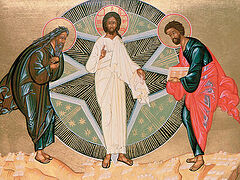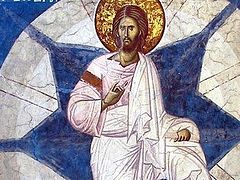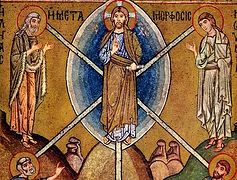Today’s feast, brethren, as you yourselves can see, has, among other things, the distinction that the fruits of our vineyards are brought to church and blessed now. The custom of presenting our firstfruits to the Lord is so ancient that we find the first traces of it already in the family of the first man. In the Church under the law, in accordance with the spirit of the Old Testament, even by a strict law it was prescribed to all the people of Israel to dedicate all the firstfruits of the earth to God. When these fruits were brought to the Temple, they were then apportioned to its priests.
There is no such commandment in the New Testament, but the feeling of filial love and gratitude before God the Benefactor, so characteristic of the children of the New Law of grace, itself disposes us to not partake of the fruits of the new year before they’re sanctified by being brought to the church of the Lord for the invocation of the all-sanctifying name of God upon them.
Therefore, the custom of bringing new fruits to the church to be blessed is among the most ancient of Christian customs. In Orthodox Greece, whence along with our faith and worship all the sacred customs have come to us, the grape clusters are ripening by now, which is why a blessing is sought in prayer primarily for grapes, which are especially abundant in eastern countries. The greater part of our homeland doesn’t have this fruit because of its northern geography, but instead, God’s providence, which divides its gifts to all unsparingly, blessed our country with many other fruits that that we now bring to church to be blessed instead of grapes. This sight is pleasant and at the same time instructive!
Yes, brethren, it is also instructive: Having brought the fruits of our fields and vineyards as a gift to the Lord, let us not forget that we all should be the most fruitful trees in the vineyard of the Lord, which is the Church of God.
It’s not without reason that St. David likens a pious man to a tree planted by the rivers of water, that bringeth forth his fruit in his season (Ps. 1:3). It’s not without reason that the Savior Himself compares His true disciples with clusters of grapes or branches of grapevines, which, receiving the juice of life from Him as the Divine vine, should bear much fruit. Conversely, by not bringing the due fruits, every sinful soul is in danger of being cut out of the vineyard and cast into the fire, as gardeners do with barren trees. This must certainly be so, for if it’s extremely unpleasant for the gardener of the earth when his many years of work on a tree don’t duly bring him fruit, then it’s a hundred times more distressing for the Heavenly Vinedresser when the soul of a man, which is of immense value to Him, remains fruitless. For what do earthly vinedressers do for their vineyards? They invest their time and money into it. But the Heavenly Vinedresser laid down His very life for His vineyard. Given that, how dear every tree must be for Him—every faithful soul! How pleasant the fruit of the vineyard and how bitter the barrenness of bad trees!
What fruit will we bring to the Lord today, brethren, from the vineyard of our hearts and souls? This fruit is our spiritual transfiguration. Think not that I use this expression only because of the present feast: No this is what our work requires. Open the books of Holy Scripture and you’ll see that mankind’s fall consisted in nothing other than that through sin it was deprived of the image of God, which adorned it in its time of innocence and was the source of all other perfections; you’ll also see that our salvation, accomplished by the power of the merits of Christ and the grace of the Holy Spirit, consists in nothing other than the restoration of the primordial image of God within us. In other words, it consists in our transfiguration from children of sin, the curse, and wrath, into children of holiness, love, and blessing. Such a transfiguration is the main object of faith, of our activity, of our lives; and thus it should be our first and last fruit offered to the Heavenly Vinedresser, Who purchased us with His own Blood.
Therefore, looking now with reverence upon the face of the Lord, shining like the sun on Tabor, let us think, brethren, that such glory awaits us as well: Then shall the righteous shine forth as the sun (Mt. 13:43) in the Kingdom of the Heavenly Father; and thinking about this, let us turn our attention to our hearts and our lives in order to see whether they have at least the beginnings of that purity and perfection that are necessary for this glorious transfiguration. Those who find within themselves a kind of pledge of this future blessedness, let them hasten to offer it as a gift to their Lord and Savior, as the fruit not so much of their own efforts as of His all-powerful grace. And those who in penetrating to the very depths of their being find the image of their soul dark and ignoble, may they make haste to be enlightened by the light of the countenance of the transfigured Lord.
Amen.




